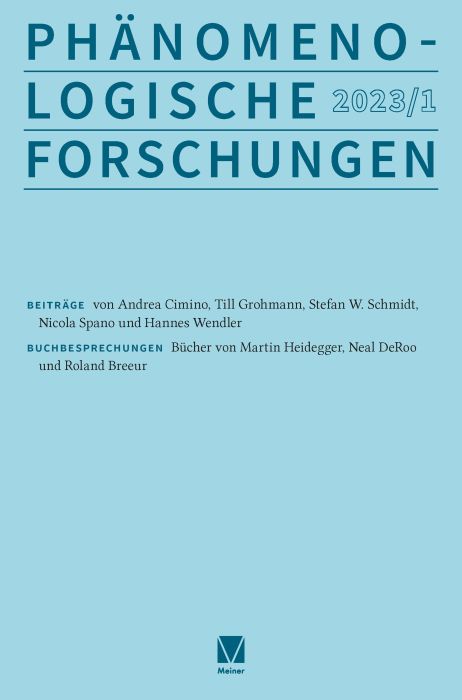Phänomenologische Forschungen 2023-1

Beschreibung
Bibliographische Angaben
| Einband | |
|---|---|
| DOI | |
| Auflage | |
| ISBN | |
| Sprache | |
| Originaltitel | |
| Umfang | 171 |
| Erscheinungsjahr (Copyright) | 2023 |
| Reihe | Phänomenologische Forschungen |
| Herausgeber/in | Inga Römer Thiemo Breyer Michela Summa |
| Beiträge von | Andrea Cimino Till Grohmann Stephan W. Schmidt Nicola Spano Hannes Wendler |
| Hersteller nach GPSR |
Felix Meiner Verlag GmbH |
Service
Einzelartikel als PDF
Prolegomena to any Noematic, Onto-Phenomenological Clarification of Sensory Illusion
This article offers the first phenomenological clarification of the objective conditions for sensory illusions focusing on the noematic ‘idea’ and a priori ontological structure that regulate the appearances of illusory things in perception. First, I will show the necessity of eidetic and noematically oriented investigations, arguing that it is an analysis of how the essence ‘Thinghood’ functions transcendentally that leads to an a priori clarification of both illusory things and their corresponding multiplicities of appearances. Accordingly, I will consider the correlate of material perception according to both its formal and material ontological structures and focus on the a priori principle of coordination and the laws of mutability and reversibility that set the framework for an analysis a parte obiecti. I will then examine the process of typification, the psycho-physical conditionality of the lived-body, and the constitution of different levels of normality and abnormality. Within this expanded analysis, I will provide a clarification of ‘false’ sensory appearances showing how both deceptive and resilient illusory cases can be scientifically accounted for on a phenomenological basis and in accordance with natural-empirical laws.
16,90 €
As is well known, Husserl develops his early phenomenological concept of “species” by elaboratinga novel form of abstraction, whichhe calls “ideating” abstraction. This paper traces systematic parallels between the works of Lotze, Bolzano and Husserl in order to gain a better understanding of Husserl’s theory of abstraction and his early conception of species. Two lines of interpretation are central to this paper. The first concerns a critique of the Kantian understanding of “concept” (and thus also of the Kantian understanding of analyticity). The second line of interpretation relates to abstraction itself. In contrast to the British empiricists, all three thinkers understand abstraction as a positive, logical and non-psychological process of bringing about an abstract attribute. Furthermore, we will recognize the importance of Bolzano’s syntactic structure of representations (Vorstellungen) for Husserl’s understanding of abstraction in the 2nd Logical Investigation. We will see that Husserl’s “ideating abstraction” depends on syncategorematic forms and cannot be understood detached from a correctly formulated proposition.
16,90 €
Entwurf einer phänomenologischen Topologie des Designs
The article sets out from an understanding of design as an aesthetic form of practical world access. This is specified to the effect that design gives the world an expression in the first place: design is a way through which the world comes to view. This assumption is to be explained in more detail by means of a phenomenologically shaped concept of topology. At the center of a phenomenological topology lies the concept of place. According to Edward Casey, the nature of place should be determined on the basis of the connection between things and the livedbody, whose topological meaning will first be explained in more detail. In the second step, it is then shown that design is topological design. Design as aesthetic workmakes the world appear by referring to the two constitutive moments of place, the gathering of things and the entangled corporeality, and thus brings the world to view in a topological fashion.
16,90 €
In this article, I analyze the working principle and associated concepts of the method of eidetic variation as illustrated by Husserl in Experience and Judgment. In so doing, I scrutinize the very specific sense in which, for Husserl, variation must be free in order to have intuition of a universal as pure, that is, as having a priori validity. I then discuss Husserl’s problematic claim that, even if totally free, the eidetic variation is actually not sufficient to achieve purity. The reason for its insufficiency, I argue, must be sought in the habits of phantasy. To this aim, I first undertake a phenomenological analysis of the essence of these habits as passive tendencies of the phantasizing ego. Then, I show that they hinder the intuition of the universal as pure by contaminating the purity of the free possibilities to be varied. Finally, I discuss whether habits of phantasy can be put out of play and whether, depending on the realizability of such a task, the whole method of eidetic variation, and, in relation to it, the possibility of a priori knowledge advocated by Husserl is to be put into question.
16,90 €
The Completion of the Reduction in Philosophical Anthropology: Reconciling Scientific, Phenomenological/Apollonian, Dionysian and Cathartic Reduction
What is the status of the reduction in realistic phenomenology? Approaching this question presupposes understanding what realistic phenomenology is. Five ways of defining realistic phenomenology are delineated: 1) lineage definitions, 2) locality definitions, 3) thematic definitions, 4) definitions from the essence of philosophy, and 5) methodological definitions. The question of reduction’s status concerns mostly a combination of 4) and 5) but also draws on historical considerations. An overview of the realists’ critiques of the phenomenological reduction reveals that this method was not unilaterally rejected and, thus, demonstrates that there is not only methodological epochism but indeed also methodological reductionism within realistic phenomenology. The common denominator of these critiques is that the reductive method in transcendental phenomenology depends on a phenomenological theory of reality. An indepth discussion of Scheler’s philosophical anthropology shows that it hinges on a principled revision and systematic completion of the reduction. Reduction is no longer viewed as a scientific method but as a technique of inner acting. From the vantage point of his voluntative realism, Scheler’s technological reductionism is spelled out in terms of a stratified scheme relating reality experiences as resistance to the levels of the vital-psychic sphere: 1) primary resistance, 2) ecologically bound resistance, 3) internalized resistance, 4) ego-dystonic resistance and 5) (dis-)inhibition and objectification of drive impulses. Drawing on Celms’s distinction between 1) reducendum, 2) reductive base, 3) reduction as an epistemic act, and 4) result of the reduction, a new and systematic interpretation of Schelerian reductions is developed for the scientific, phenomenological/Apollonian, Dionysian, and cathartic reductions. Each reductive technique cultivates man’s facultative dispositions (intellect, will, feeling). Only their concerted cooperation unlocks man’s full cognitive and ethical potential.
16,90 €
16,90 €

